“In life, we’re always closer to the edge than we like to admit, never guaranteed our next breath, never sure of what will follow this moment.”
— Caroline Van Hemert, The Sun Is a Compass: A 4,000-Mile Journey into the Alaskan Wilds
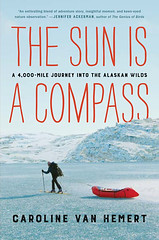 The Sun Is a Compass: A 4,000-Mile Journey into the Alaskan Wilds
The Sun Is a Compass: A 4,000-Mile Journey into the Alaskan Wilds
by Caroline Van Hemert
![]()
The first adult book I remember reading was a true-life adventure, a description of a year in the Arctic by a Danish explorer. I was totally swallowed up in it. Over the years, I’ve come back to memoirs and tales of adventure again and again, classic and contemporary.
“The Sun Is a Compass” is the first one I’ve read written by a woman adventurer. It contains a nice balance of description and personal reflection: the difficult logistics involved in planning and executing a long journey by water and land, the hardships and beauty Caroline and her husband Pat meet on their journey, fascinating details of the animals they encounter along the way, historical details about human artifacts and settlements in the far North, plus Caroline’s plans for the future, her thoughts about raising a family, her relationship with her husband and fellow-explorer.
My hair was on end through the chapters describing the first leg of their trip, on flimsy home-made rowing sculls, up the coast of British Columbia from Vancouver to Haines. Neither had any rowing experience, nor any time on open ocean water, and they must have come far closer to death than either of them realized. I caught myself thinking “The Canadian Coast Guard should have stopped them … people should have to pass a rigorous test and be credentialed before being allowed to attempt such a thing” more than once. In the end, I could only admire their courage and determination. I was less worried while reading the chapters detailing their river and overland trek from Haines into the Yukon and on to the Arctic Ocean … until, that is, they encountered an aggressive black bear in the Brooks Range.
Did it help that I once lived in Alaska and have been to some of the places Caroline describes passing through, frequently flying air defense missions over the Brooks Range, Arctic Ocean, and Bering Strait, always wondering in the back of my mind how long I’d survive down there should I have to abandon my aircraft? I suppose so, but I think I’d have been equally enthralled had she described a trek in the Himalayas or some other part of the world unknown to me.
In short, I couldn’t put the book down. Might as well have been the ten-year-old I was when I read that book by the Danish explorer. I especially loved the coda, Caroline’s brief chapter of a later hike north of Haines with her husband and new baby boy.
“I just wish,” she said, “that this magnificent, stupendous God of yours could give a fuck.”
— Michel Faber, The Book of Strange New Things
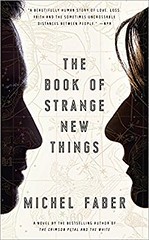 The Book of Strange New Things
The Book of Strange New Things
by Michel Faber
![]()
I read Faber’s “The Book of Strange New Things” right after his very impressive “Under the Skin.” I didn’t expect it to be the same kind of experience, and it wasn’t. Where the two novels resemble one another, though, is in the use of questionable science fiction elements to advance Faber’s stories.
The story here is the experience of a human missionary sent to the planet Oasis to spread the gospel to its inhabitants, the deterioration of his relationship with the wife he left behind on Earth, his dawning understanding of why he was recruited to minister to the Oasans and what his employer’s reasons are for establishing an outpost there, and the real reason the Oasans seem responsive to his preaching. There’s a fascinating story here, the last point in particular one I haven’t seen explored in any science fiction novel or story I’ve read … and I’ve read a lot.
As with “Under the Skin,” Faber’s world-building, even though I knew it was only there to provide a backdrop to the story, had me constantly asking questions. At one point I put the book aside to read some reviews on Goodreads; one of the reviewers counseled patience … all my questions would be answered, he said. Uh, no. All my questions were not answered, and even though I enjoyed the story those unanswered questions continue to bother me.
“There is an aspect of my character that tends to latch on to one difficult but potentially solvable problem, rather than grapple with the vast and unsolvable problem that would be all I could see, if I were to look up, figuratively speaking, from my small blue notebooks.”
— Ben H. Winters, Countdown City
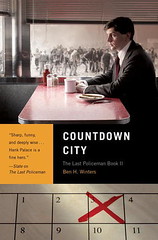 Countdown City (The Last Policeman #2)
Countdown City (The Last Policeman #2)
by Ben H. Winters
![]()
I’ve finished the second installment in Ben Winter’s Last Policeman series, “Countdown City.” Here’s some of what I said after reading the first novel, “The Last Policeman”:
The SF angle [of the Last Policeman novels] is that an asteroid is on a collision course with Earth and will impact in a few months, ending human life on the planet. Meanwhile, life goes on for the citizens of Concord, New Hampshire. Life goes on for Hank Palace, a newly-promoted detective sergeant, in particular. Along with a small subset of the population, he remains dedicated to his job, because what else is there? While others quit work to tick items off their bucket lists, go on benders for the duration, or merely kill themselves rather than face the apocalypse, he perseveres. […]
As a police procedural — Detective Palace slowly unravels a murder everyone else wants to brush off as just another “hanger,” or suicide — it […] meets muster. I thought some of the big revelations that come Detective Palace’s way were too easy, too contrived, and I got a bit impatient with Palace’s habit of mentally kicking himself for not seeing the big picture sooner, but those are minor niggles.
It’s getting closer to the end of the world, and what’s left of society and government is falling apart. Of course Hank Palace sees and tells us about a limited slice of the world, New England and only a bit of that, but we learn of “catastrophe immigrants” making their desperate way to American shores so we can assume things are much worse elsewhere. And they’re pretty damn bad where Palace is.
Palace here, in the second novel, is incredibly stubborn in sticking to his good guy guns, and I find him somewhat unlikable because of that. Pretty sure if he and I were locked in a cell together, I’d have to strangle him in his sleep. And once again, Palace’s logical leaps … here, they turn out to be wrong as often as they are right … sort of defy belief.
But if the world were really about to end and everyone knew exactly when, I think Winters has a good feel for how it’s likely to go.
At the end of “Countdown City,” Palace realizes his work is not yet done. He has one final quest before him, and I will absolutely read about it in “World of Trouble,” the final book of the trilogy.
“Like most families, the Galvins were at the mercy of what was a mental health care system in name only, forced to choose from options they weren’t equipped to assess.”
— Robert Kolker, Hidden Valley Road: Inside the Mind of an American Family
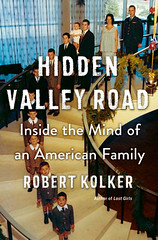 Hidden Valley Road: Inside the Mind of an American Family
Hidden Valley Road: Inside the Mind of an American Family
by Robert Kolker
![]()
“Hidden Valley Road” was my book club’s selection for April 2021.
I stovepipe, publishing my reviews as standalone blog posts, not normally discussing what I’ve read in other posts. With this one, I made an exception. Here’s I wrote about it in an earlier blog post:
Tell you what, though. I just finished “Hidden Valley Road: Inside the Mind of an American Family,” my book club’s April selection,“The heartrending story of a midcentury American family with twelve children, six of them diagnosed with schizophrenia, that became science’s great hope in the quest to understand the disease.”
Apart from my surprise that anyone this side of the Middle Ages would choose to have twelve children (ten boys in a row, followed by two girls), and that half of them would develop schizophrenia in their teens, Kolker’s casual recounting of the way the kids started drinking and doing drugs in their early teens … as young as eleven, some of them … floored me. Was I raised in some Hardy Boys universe where starting so young would have been unthinkable? Apparently so!
I drank my first beer as a junior in high school, at sixteen or seventeen, and didn’t try marijuana until I was twenty. The Galvin kids were doing all that and more before puberty. Not just beer, hard liquor, and marijuana: they used cocaine, LSD, meth, and opium, sharing it with siblings and friends. These were middle-class children from the right side of the tracks, and the way Kolker presents their histories of alcohol and drug use, everything they did was normal for kids in their Colorado Springs community, no big deal. It had nothing to do with the schizophrenia six Galvin boys developed, the main point of the narrative; for the six who dodged the genetic bullet and grew into functioning adults, their early alcohol and drug use had no lasting effects on their lives.
Even so! I was shocked!
Which is a good thing, I guess, because it kept me turning pages, even through the boring parts describing the history of psychiatric and genetic research into the origins of schizophrenia. My overwhelming sense of the book, now I’ve read it, remains as above. Even so! I am shocked!
My last comment has nothing to do with schizophrenia. How curious it that my book club selects this book about the Galvin family, in which the father, mother, and several sons were almost fanatical in their love of falconry, at the same time I’m reading, just for fun, the Joe Pickett novels of C.J. Box, in which falconry plays a major role? Conspiracy … or coincidence?
“We recycle, don’t we, Alex? And we replaced all of our lightbulbs. You know, with the ones that don’t work very well? And one of my cars is a Prius. It’s not like I don’t care.”
— C.J. Box, Below Zero
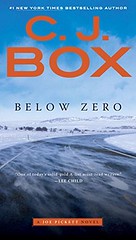 Below Zero (Joe Pickett #9)
Below Zero (Joe Pickett #9)
by C.J. Box
![]()
I’m reading C.J. Box’s Joe Pickett novels, which are set in a mountainous, sparsely-populated corner of Wyoming and feature a fish & game warden who finds himself and his family threatened by bad men intent on raping the West. They’re great reads, engrossing and impossible to put down, and I’m devouring the series.
It’s a struggle to write meaningful reviews of individual novels in a series. Unless I have something urgent to say about individual Joe Pickett novels, I’ll repeat what I said about “Open Season,” the first novel in the series:
As much as I enjoy reading Lee Childs’ Jack Reacher stories, Jack is a superhero, a figure of fantasy. When Jack Reacher gets even, people die … but not before a righteous ass-kicking. While C.J. Box brings on Reacheresque tension and villainy, when it comes to his human and relatable hero Joe Pickett, it’s more a matter of luck. Joe prevails, a believable form of getting even. But don’t worry. Asses do get kicked, in satisfying ways. I really like this Pickett guy. He makes mistakes, and plenty of them. He worries about money. He trusts people he shouldn’t. He’s a regular Joe. I really like the depictions of Wyoming, a state I lived in as a teenager and remember fondly. Joe, at least in this first novel, has an almost-too-perfect family, but there are tensions, and I sense troubled teenage years ahead for his daughter Sheridan. Granted that everything in this novel is fiction, it feels real and true.
I’m less happy with “Below Zero” than I have been with previous Joe Pickett novels. In the first chapters the writing struck me as off. It felt a little as if C.J. Box had farmed out some scenes to another author. An example: starting sentences containing quotes from one or another of the characters with “Said Marybeth” or “Said Stenko.” Who talks like that? Who writes like that? Halfway through the story a goof leapt off the page: the use of “duel” where “dual” was meant. After reading the first eight Joe Pickett novels in order, I was surprised to see odd locution and typos where I had seen none before.
I strained to believe the villains in this story, the Chicago mobster Stenko and his cartoonishly nasty son Robert, and anything about their mission to offset the carbon footprints of conspicuous consumers by killing them. Reader, I failed. They were just there to give Joe and Nate something to do. The return of Alice, while equally far-fetched, was more acceptable to me, since C.J. Box often refers back to things that happened in previous novels and maintains continuity from one to the next.
The interactions here between Joe and Nate, and especially between Joe and his daughter Sheridan, were the strengths of this novel.
“The guy did okay for himself.”
— Nelson DeMille, Spencerville
 Spencerville
Spencerville
by Nelson DeMille
![]()
Borrowed from my subdivision’s mini-library. I recognized the author’s name as a best-selling writer of spy thrillers and thought I’d be entertained. Good lord, what a windbag DeMille turns out to be!
I managed to get to the end of this 600-page-plus doorstop by skipping over the tedious parts, fully three-quarters of the book, page after page of idle chitchat by a cast of characters DeMille did nothing to make me care about. The least he could have done, if he was determined to write at such length, would have been to give the main character a decently interesting backstory, but all I got was the notion he’d played some undefined but possibly important role in Cold War events, nothing specific.
This guy Landry, built up as a 30-year military intelligence officer and analyst with James Bond-like undercover operative skills (which isn’t how it works IRL), is defeated at almost every turn by a corrupt country bumpkin cop, and in the end doesn’t even manage to kill the villain … his girlfriend does it for him. The girlfriend who, by the way, spends half her scenes naked for no good reason, and toward the end decides she wants to get pregnant with Landry’s child … this after a 30-year marriage to the aforesaid country bumpkin. One wonders if that ship hasn’t sailed.
I like my thrillers to thrill. “Spencerville” doesn’t.
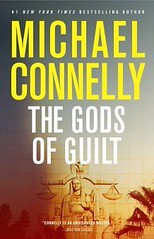 The Gods of Guilt (Mickey Haller #5)
The Gods of Guilt (Mickey Haller #5)
by Michael Connelly
![]()
Did not finish/no rating.
I checked this out because my library had it immediately available as a downloadable ebook, and I’ve enjoyed Connelly’s Bosch novels. I had doubts about reading a courtroom drama, and perhaps that prejudiced me beforehand. If so, I grant my reaction was at least partially my fault, but once I started reading found myself too bored and uninterested in the novel’s insider talk about the justice system to go on. How curious that I willingly endure the insider cop talk of Connelly’s Bosch character, then get put off by the same approach to a story about Mickey Haller, Connelly’s ambulance chaser character.